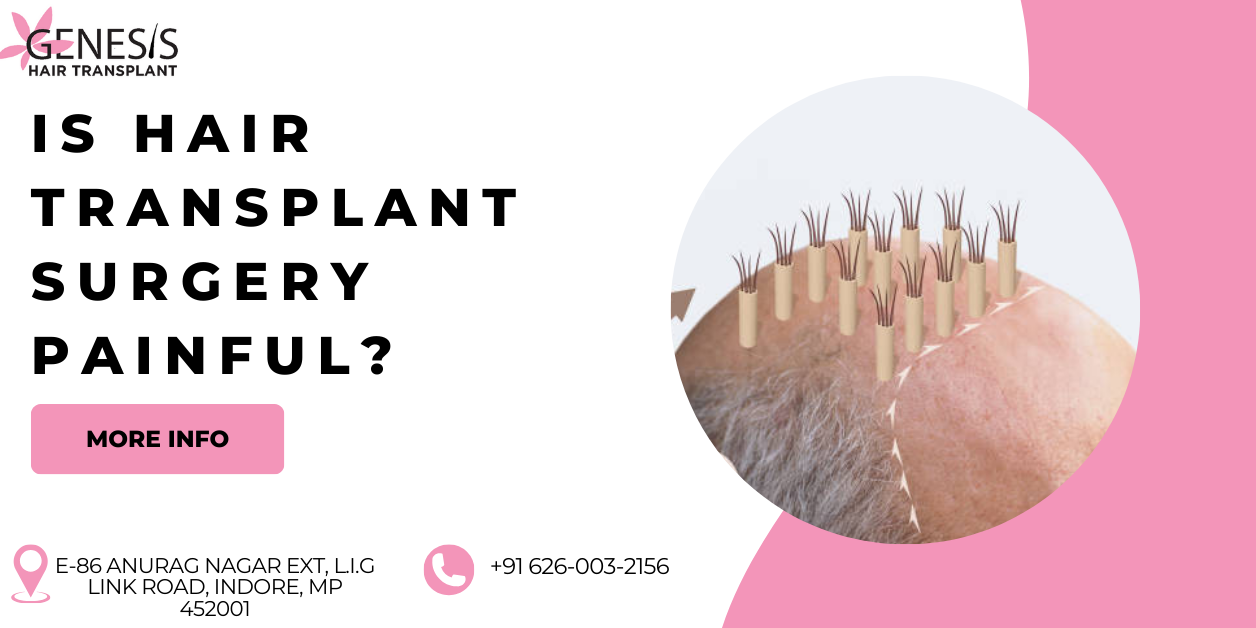Blogs
Home
Blogs
Is Hair Transplant Surgery Painful?
Hair transplant surgery has become an increasingly popular solution for those dealing with hair loss, offering a permanent way to restore hair and confidence. However, one of the most common questions people have before considering this procedure is: “Is hair transplant surgery painful?” Let’s dive into what you can expect during and after the surgery to answer this concern.
January 13, 2025 • 4 min read

The Procedure: Minimizing Pain with Modern Techniques
Hair transplant surgery is generally well-tolerated, thanks to advancements in medical technology and surgical techniques. Here’s an overview of the process and how pain is managed:
Local Anesthesia: Before the procedure begins, the surgeon administers local anesthesia to numb the scalp. This step ensures that you don’t feel pain during the procedure. You might feel slight discomfort during the injection, similar to a pinprick, but this sensation is brief.
Techniques Used:
FUE (Follicular Unit Extraction): In this technique, individual hair follicles are extracted and transplanted to the thinning or balding areas. FUE is minimally invasive and causes less discomfort compared to older techniques.
FUT (Follicular Unit Transplantation): This involves removing a strip of scalp from the donor area, which is then divided into grafts. While FUT might involve more discomfort during recovery due to the linear scar, pain is still manageable with proper care.
During the Surgery
Once the anesthesia takes effect, you won’t feel any pain during the hair extraction or implantation process. Many patients report feeling relaxed and even watch TV or listen to music during the procedure.
Post-Surgery Experience
After the surgery, it’s normal to experience mild discomfort as the anesthesia wears off. Here’s what you might feel:
Tenderness and Soreness: The donor and recipient areas might feel tender for a few days.
Itching: Itching is a common part of the healing process and indicates that your scalp is recovering.
Swelling: Some patients experience mild swelling around the forehead or eyes, but this subsides within a few days.
Pain Management
Your surgeon will provide detailed post-operative care instructions to manage any discomfort. Common recommendations include:
Pain Medication: Over-the-counter or prescribed painkillers can help alleviate soreness.
Cold Compress: Applying a cold compress can reduce swelling and provide relief.
Gentle Washing: Following the surgeon’s guidelines for washing your hair helps prevent irritation and promotes healing.
How Long Does Discomfort Last?
Most patients report that any discomfort they experience is mild and lasts only a few days. By following the aftercare instructions, you can ensure a smooth recovery and minimize pain.
Final Thoughts
Hair transplant surgery is not as painful as many people fear. Thanks to local anesthesia and advanced techniques like FUE, the procedure is designed to be as comfortable as possible. Any post-operative discomfort is manageable and temporary, making the benefits of restoring your hair well worth the effort.
If you’re considering a hair transplant and have concerns about pain, it’s always best to consult with an experienced surgeon. At Genesis Hair, we prioritize patient comfort and use cutting-edge techniques to deliver excellent results. Visit Genesis Hair to learn more or schedule a consultation with our experts.
Our Blogs

19 Feb 2025 • 4 min read



